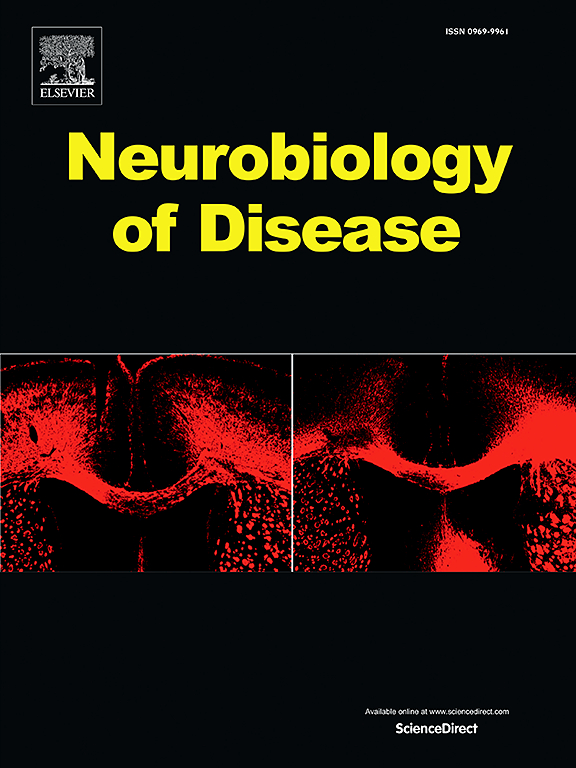鞘磷脂酶活性降低与前颗粒蛋白缺乏和额颞叶痴呆相关。
IF 5.1
2区 医学
Q1 NEUROSCIENCES
引用次数: 0
摘要
影响溶酶体蛋白前颗粒蛋白的功能丧失突变是额颞叶痴呆的主要原因。颗粒蛋白前突变导致溶酶体脂质加工异常,特别是鞘脂异常,鞘脂是神经细胞膜的主要成分,在大脑中起重要的信号作用。这一领域的研究主要集中在两类鞘脂:神经节脂苷类和脑脂类。在这里,我们检测了参与另一类鞘脂代谢的酶,鞘磷脂,在小鼠模型和蛋白前不足的患者中。在颗粒蛋白前敲除小鼠中,酸性鞘磷脂酶活性降低,但杂合小鼠没有。这是由于酸性鞘磷脂酶(Smpd1)蛋白转录后缺失所致。在免疫沉淀和接近结扎实验中,前颗粒蛋白与酸性鞘磷脂酶相互作用,表明前颗粒蛋白与其他溶酶体酶一样具有共同运输作用。与该假设一致,使用aav -前颗粒蛋白基因疗法恢复敲除小鼠的前颗粒蛋白可以纠正酸性鞘磷脂酶缺陷。在由杂合子蛋白前突变引起的额颞叶痴呆患者的死后脑组织中,中性但非酸性,鞘磷脂酶活性降低。中性鞘磷脂酶2 (SMPD3)是大脑中主要的中性鞘磷脂酶,在颗粒蛋白前突变的患者中减少。类似的趋势(p = 0.0586)在A型TDP-43病理的散发性额颞叶变性患者中发现,但在其他类型的额颞叶变性中没有发现。中性鞘磷脂酶2的减少发生在额叶皮质,而不是枕叶皮质,这与FTD中额叶区域的选择性易损性有关。这些数据揭示了前颗粒蛋白在鞘磷脂代谢中的作用以及这一途径在额颞叶痴呆中的作用。本文章由计算机程序翻译,如有差异,请以英文原文为准。
Reduction of sphingomyelinase activity associated with progranulin deficiency and frontotemporal dementia
Loss-of-function mutations affecting the lysosomal protein progranulin are a leading cause of frontotemporal dementia. Progranulin mutations cause abnormalities in lysosomal lipid processing, particularly of sphingolipids, major components of neural cell membranes that play important signaling roles in the brain. Most work in this area has focused on two classes of sphingolipids, gangliosides and cerebrosides. Here, we examined enzymes involved in metabolism of another class of sphingolipids, the sphingomyelins, in both mouse models and patients with progranulin insufficiency. Acidic sphingomyelinase activity was decreased in progranulin knockout, but not heterozygous, mice. This resulted from post-transcriptional loss of acid sphingomyelinase (Smpd1) protein. Progranulin interacted with acid sphingomyelinase in immunoprecipitation and proximity ligation assays, suggesting a co-trafficking role like progranulin plays with other lysosomal enzymes. Consistent with that hypothesis, restoring progranulin in knockout mice using AAV-progranulin gene therapy corrected acid sphingomyelinase deficits. In post-mortem brain tissue from patients with frontotemporal dementia due to heterozygous progranulin mutations, neutral, but not acidic, sphingomyelinase activity was decreased. Neutral sphingomyelinase 2 (SMPD3), the predominant neutral sphingomyelinase in the brain, was reduced in patients with progranulin mutations. A similar trend (p = 0.0586) was seen in patients with sporadic frontotemporal lobar degeneration with type A TDP-43 pathology, but not in other types of frontotemporal lobar degeneration. The reduction of neutral sphingomyelinase 2 occurred in frontal, but not occipital cortex, correlating with the selective vulnerability of frontal regions seen in FTD. These data shed light on the role of progranulin in sphingomyelin metabolism and of this pathway in frontotemporal dementia.
求助全文
通过发布文献求助,成功后即可免费获取论文全文。
去求助
来源期刊

Neurobiology of Disease
医学-神经科学
CiteScore
11.20
自引率
3.30%
发文量
270
审稿时长
76 days
期刊介绍:
Neurobiology of Disease is a major international journal at the interface between basic and clinical neuroscience. The journal provides a forum for the publication of top quality research papers on: molecular and cellular definitions of disease mechanisms, the neural systems and underpinning behavioral disorders, the genetics of inherited neurological and psychiatric diseases, nervous system aging, and findings relevant to the development of new therapies.
 求助内容:
求助内容: 应助结果提醒方式:
应助结果提醒方式:


